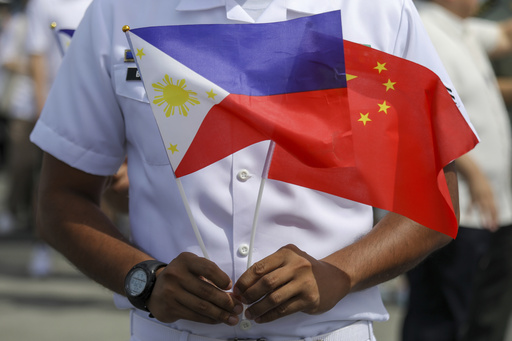The U.S. military is open to discussions regarding escorting Philippine ships in the disputed South China Sea, as tensions escalate between Beijing and Manila in the contested waters. Adm. Samuel Paparo of U.S. Indo-Pacific Command expressed willingness to consider escorting Philippine vessels during a news conference alongside Philippine Armed Forces chief Gen. Romeo Brawner Jr. in Manila. Paparo’s comments shed light on a potential operation that could involve U.S. Navy ships encountering Chinese vessels directly.
Philippine ships frequently face confrontations with Chinese coast guard, navy, and suspected militia ships while trying to resupply Filipino sailors in parts of the South China Sea claimed by both countries. As hostilities intensify, with Filipino sailors sustaining injuries and their ships being damaged, the Philippine government is under scrutiny regarding the possibility of invoking a treaty alliance with the U.S.
Paparo and Brawner addressed reporters following an international military conference in Manila, organized by U.S. Indo-Pacific Command, where China’s aggressive actions in the South China Sea were a focal point. Although Chinese representatives were absent, military, defense officials, and diplomats from the U.S. and allied nations attended the conference.
When asked about the potential for the U.S. military to escort Philippine ships delivering supplies to Filipino forces in the South China Sea, Paparo emphasized the importance of consultations between the two sovereign nations. Brawner responded cautiously to the suggestion, citing Philippine laws that prohibit foreign forces from participating directly in local combat operations.
President Ferdinand Marcos Jr. mentioned that there has not been a situation necessitating the activation of the treaty, which mandates mutual aid between allies in the event of an external attack. President Joe Biden and his administration have reiterated their strong commitment to defending the Philippines under the 1951 treaty if Filipino forces face armed aggression, including in the South China Sea.
During the conference, Philippine Defense Secretary Gilberto Teodoro Jr. criticized China as the main disruptor of peace in Southeast Asia and called for increased international condemnation of China’s actions in the South China Sea. Teodoro underscored the need for stronger collective multilateral action against China and urged the Association of Southeast Asian Nations (ASEAN) to address China’s activities in the region.
The recent incident in the South China Sea involved China deploying a significant number of ships to obstruct two Philippine vessels delivering supplies to Manila’s largest coast guard ship at Sabina Shoal. Both China and the Philippines accused each other of escalating tensions at the atoll, which has become a contentious area in the disputed Spratlys region.
China’s growing military presence and assertiveness in asserting territorial claims in the South China Sea, which it considers its own, have led to heightened tensions and frequent confrontations, particularly with the Philippines. Japan also registered a protest against Beijing for a Chinese reconnaissance plane violating its airspace, prompting Japan to scramble fighter jets in response.


